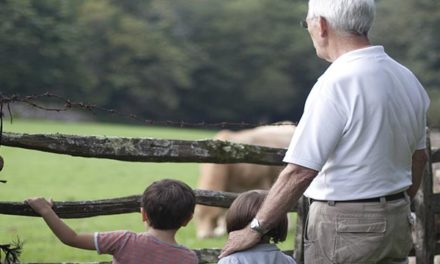by Cavin Harper
Greg rises at 5:30 each morning to head for an intense 45-minute workout at the gym. After his workout, he makes a dinner reservation for his anniversary on his iPhone, sends a text to his wife to let her know what time he will be picking her up, responds to several other texts, checks in with his secretary, scrolls through Facebook and Twitter posts, and downloads the latest Wall Street Journal. Before heading to the office, Greg stops at Starbucks for his regular Caramel Macchiato. Greg is also a grandfather of four.

Between Gen Xers and baby boomers, grandparents have burst on the scene in record numbers. More grandparents live in America today than at any other time in our history, but we’re not in Kansas anymore. These are not your grandmother’s variety.
In addition to being more active and living longer than previous generations, a rapidly growing number of grandparents represent another kind of explosion that has completely altered their dreams of grandparenting—grandparents raising grandchildren.
Bob and Sharon are among them. They looked forward to becoming grandparents and imagined the exciting opportunities it would bring. When their first grandchild, Paige, was born, it was a time of indescribable joy. Yet the sobering reality that invaded that moment of wonder unleashed a torrent of emotions and questions for which they were not prepared. Their dreams for the second half of their lives vaporized.
Suddenly, they found themselves among the growing rank of grandparents who would be assuming responsibilities not normally expected of grandparents. Seven months after their granddaughter’s birth, the mother (their daughter), was incarcerated and sentenced to six years in prison. The father was not in the picture.
Now in their early fifties, not only were they grandparents, but parents once again. They found themselves in the role played by millions of grandparents nationwide who serve as primary caregivers to their grandchildren.
While Bob and Sharon’s story represents a relatively small percentage of the more than eighty million grandparents in the United States today, their story is an increasingly common one. According to the 2010 US Census Bureau, it is estimated that between eight and ten percent of all children under 18 are being raised by grandparents. A recent conversation with a state Grandparent Advocate revealed that she believes that number is closer to fifteen or sixteen percent.
Grandparents raising grandchildren is not restricted to any particular race or social class. These children come from homes in upper income neighborhoods as well as low-income neighborhoods. Abuse, drugs, imprisonment, divorce or death of a parent are the common causes. For grandparents in this situation, grandparenting is radically different from anything they had imagined.
Unlike the joyous expectations of new parents at the birth of a child, these grandparents have been forced into a ‘parent’ role, often without warning, and deprived of the grandparent role they had so much anticipated. To add insult to injury, the judicial system and other institutions rarely view them or treat them as family. They are a classless demographic often ignored or overlooked. Sadly, the church can often be another lonely place to endure for the sake of their grandchildren.
Even grandparents not in these unique grandparenting situations must deal with the realities and dangers of a digital world. How does one keep up with it all? We probably can’t, but we do need to know enough to understand the dangers in the world our grandchildren must navigate. With face-to-face interactions often reduced to text messages and likes on Facebook, the opportunities to do life with our grandchildren can sometimes feel like trying to catch soap bubbles in the air.
This is the new face of grandparenting.
Is it better or worse than previous generations? It is neither—it is merely a unique opportunity to make a difference. In spite of the obstacles, opportunities abound for today’s grandparents, whatever the situation, to intentionally live lives that matter for the next generation.
Let me suggest a few basic tips to help you in that journey:
- Engage with your grandchildren’s world. Resist the temptation to retreat into your own world. Make every effort to enter and understand their world in order to understand how they see life. Technology can be a great way to stay connected when that face-to-face option is limited. I text my teenage grandchildren several times a week just to let them know I am praying for them and how much I love them. It takes very little time to do.
- Learn to listen and ask questions, rather than dispense advise. You may have been around the block a few times, and learned a lot about life, but remember that wisdom is not found among the arrogant or prideful.
- Remember that little things matter. Sometimes low-tech tools (cards, handwritten letters) can have amazing impact. Simple gifts on a special occasion or going out for ice cream can open up doors of opportunity for meaningful conversation.
- Establish a tradition of spoken blessing in your family. Cultivating a regular practice of speaking blessing over your grandchildren (and their parents) can be huge. We offer a free Create a Legacy of Blessing Guide download here.
- Link arms with other grandparents. Whether you’re raising your grandchildren, long-distance grandparenting, or any other situation, we need to join hands with those who are in this journey too. Don’t be a loner. Start a small group of grandparents who can help and support one another.
- Pray fervently… every day! This is not last because it is least important, but because it is of primary importance. I want this to be the last thing on your mind so it will become the first thing you do.
The face of grandparenting may be changing, but the potential to influence another generation has not. We can still leave a legacy that matters. It’s a matter of intentionality.

Cavin Harper is Founder and Executive Director of Christian Grandparenting Network (christiangrandparenting.net). He is author of Courageous Grandparenting: Unshakable Faith in a Broken World as well as several articles and blogs. Cavin has served in various ministry positions and has operated a retreat center with his wife Diane. They have been married for 44 years, have two children and nine grandchildren, and live in Colorado Springs.




